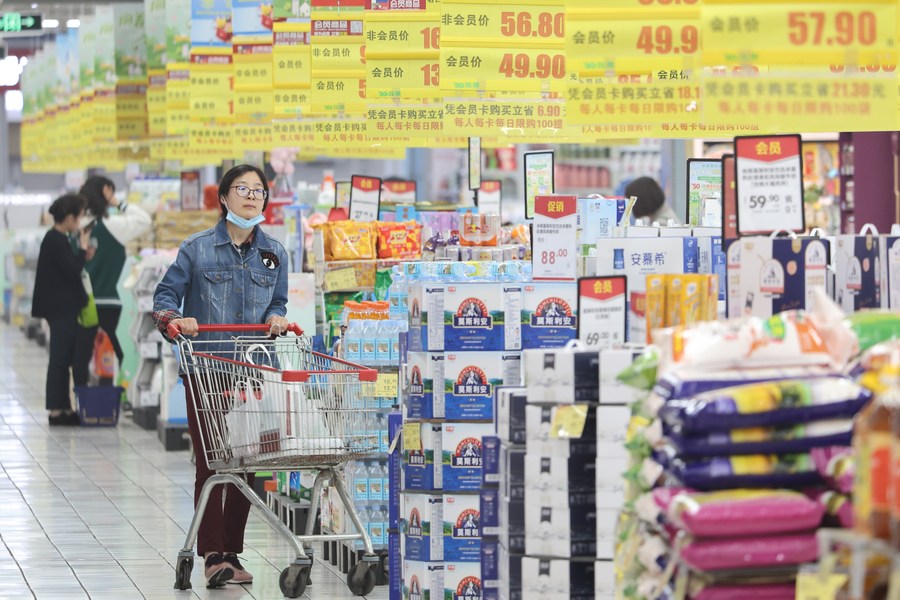China dismisses deflation concerns, expects further demand recovery

People shop at a supermarket in Nanjing, east China's Jiangsu Province, April 11, 2023. (Photo by Su Yang/Xinhua)
BEIJING, April 22 (Xinhua) -- Despite slower price growth in China since the start of this year, concerns over deflations in the country are unnecessary as its economy is on a solid recovery track amid pro-growth policies, officials and analysts said.
China's consumer price index (CPI), a main gauge of inflation, rose 0.7 percent year on year in March, compared with the 2.1 percent and 1 percent gain seen in January and February, respectively.
At a press conference this week, Fu Linghui, a spokesperson with the National Bureau of Statistics, said deflation is not evident in China at present and will not appear in the next stage.
Deflation refers to a continuous fall in the general price level, often accompanied by a reduced money supply and economic recession, Fu said.
Fu cited a mild 1.3 percent year-on-year uptick in the CPI and a robust 4.5 percent GDP expansion in the first quarter of the year, as well as a relatively fast growth of 12.7 percent in M2, a broad measure of money supply that covers cash in circulation and all deposits, at the end of March.
Zou Lan, an official with the People's Bank of China, said that rapid monetary credit growth and a fall in prices were essentially a result of time lags.
Compared with supply, demand recovery is relatively slow as it takes time to lift people's consumption willingness, especially when it comes to bulk consumption, according to Zou.
Ming Ming, the chief economist at CITIC Securities, echoed Zou's words, saying that there was a stronger demand for longer-term loans among businesses, indicating a faster recovery in production.
There were, however, already visible rises in the prices of offline activities such as travel and medical services, said Zhao Wei, an analyst with Sinolink Securities.
Official data showed that China's contact-based industries, including travel and catering, have registered rapid expansion in the first three months.
The value-added output of the accommodation and catering sector surged 13.6 percent year on year in the first quarter, in sharp contrast to a decline of 5.8 percent in the fourth quarter last year.
Looking forward, Zou said that China's consumer demand would revive as the effects of the supportive financial policies become more evident.
As the aggregate supply and demand are generally balanced, the monetary conditions are reasonable and moderate, residents' expectations are stable, and there is no long-term deflation or inflation basis in the country, Zou added.
Fu said that consumer prices would recover steadily in the next stage.
The CPI index is expected to stay low in Q2 due to the high comparison base from the same period last year, said Fu. He added that with influencing factors generally alleviated, overall prices would return to the regular level in the second half of the year.
Ming said the change in people's willingness to borrow is underway, citing a rebound in commercial housing sales in early April. The possibility of deflations in China is not high, Ming said.


